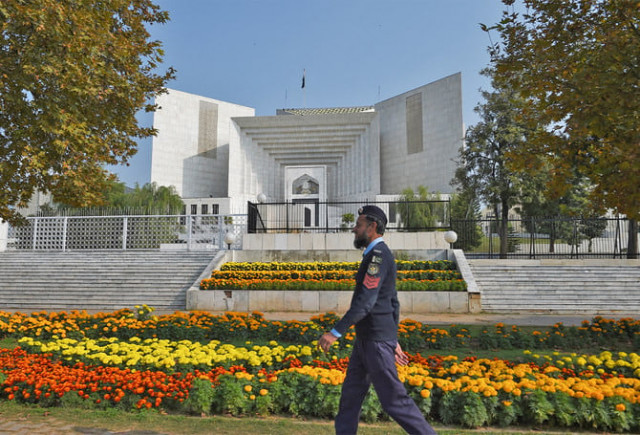Women accused of non-bailable offences entitled to bail: SC
Any under-sixteen person, woman or any sick, infirm person accused may be released on bail

The Supreme Court has declared that women accused of offences, which are otherwise held to be non-bailable under the relevant laws, are entitled to a grant of bail barring exceptional circumstances.
In a judgment authored by Justice Syed Mansoor Ali Shah, the SC noted that irrespective of the category of offence, the court was empowered to grant bail to the accused involved in offences even that fall within the prohibitory clause of subsection (1) of Section 497 of CrPC because they attract the principle that grant of bail was a rule and refusal an exception.
The bench was hearing the post-arrest bail of a woman involved in the offences punishable under Sections 395 and 412 of PPC.
The judgement said that the first proviso to Section 497(1) CrPC provides that the court “may direct that any person” under the age of sixteen years or any woman or any sick or infirm person accused of such an offence be released on bail.
It is noteworthy that for non-bailable offences, Section 497 of the Code of Criminal Procedure (CrPC) provides that the accused shall not be given bail if there are “reasonable grounds for believing” that they are “guilty of an offence punishable with death, imprisonment for life or imprisonment for ten years”.
The judgment noted that the first part of Section 497(1) CrPC provides that if a person accused of a non-bailable offence is arrested, he may be released on bail. Since the enabling expression of “may be released on bail” is used in this part, read with the basic principles of criminal justice, the grant of bail in a non-bailable offence that does not fall within the second part of Section 497(1) CrPC is said to be a rule and refusal an exception.
"The second part of Section 497(1) CrPC provides that an accused shall not be released on bail if there appear reasonable grounds for believing that he has been guilty of an offence punishable with death or imprisonment for life or imprisonment for ten years. This part of Section 497(1) CrPC which prohibits the grant of bail in certain offences is popularly known as the prohibitory clause of Section 497(1) CrPC."
However, the order said that the first proviso to Section 497(1) CrPC provides that the court may direct that any person under the age of sixteen years or any woman or any sick or infirm person accused of such an offence be released on bail.
The expression “such an offence” used in this proviso refers to the offence mentioned in the second part (prohibitory clause) of Section 497(1) CrPC, as for all other non-bailable offences the court is already empowered to release the accused on bail under the first part of Section 497(1) CrPC.
The first proviso has thus made equal the power of the court to grant bail in the offences of prohibitory clause alleged against an accused under the age of sixteen years, a woman accused and a sick or infirm accused, to its power under the first part of Section 497(1) CrPC.
"This means that in cases of women, etc., as mentioned in the first proviso to Section 497(1), irrespective of the category of the offence, bail is to be granted as a rule and refused as an exception in the same manner as it is granted or refused in offences that do not fall within the prohibitory clause of Section 497(1) CrPC.
Exceptions
The apex court also noted that the exceptions for refusing bail in offences that do not fall within the prohibitory clause of Section 497(1) CrPC are therefore also applicable to the accused who pray for bail under the first proviso to Section 497(1) CrPC in an offence falling within the prohibitory clause.
“These exceptions are well settled by several judgements of this court. They are the likelihood of the accused: (a) to abscond to escape trial; (b) to tamper with the prosecution evidence or influence the prosecution witnesses to obstruct the course of justice; or (c) to repeat the offence keeping in view his previous criminal record, nature of the offence or the desperate manner in which he has prima facie acted in the commission of the offence."
Regarding the case in hand, the bench noted that they do not find any material that would attract any of the above exceptions in order to refuse bail to the present petitioner.
"We are cognizant of the fact that the persons involved in the commission of offences of robbery or dacoity are usually professional criminals and there is a likelihood that they would repeat the offence if enlarged on bail. But the case of the present petitioner is distinguishable as she was working as a maid in the house of the complainant as per his own version, therefore, she does not appear to be a professional robber or dacoit and we do not find a likelihood of her repeating the offence if released on bail."
"The impugned order passed by the high court is, thus, not sustainable under the law and calls for interference by this Court. This petition is, therefore, converted into appeal and the same is allowed: the impugned order is set aside and the petitioner is admitted to post-arrest bail subject to her furnishing bail bond in the sum of Rs.50,000/- with two sureties in the like amount to the satisfaction of the trial court."
The court also noted that concession of bail may be cancelled by the competent court under Section 497(5) CrPC, if the petitioner misuses it in any manner, including causing a delay in the expeditious conclusion of the trial.


















COMMENTS
Comments are moderated and generally will be posted if they are on-topic and not abusive.
For more information, please see our Comments FAQ